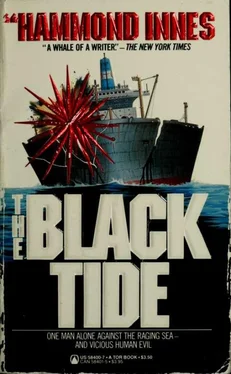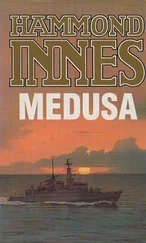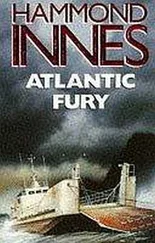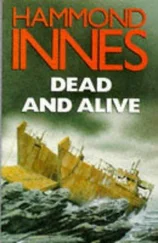Hammond Innes - The Black Tide
Здесь есть возможность читать онлайн «Hammond Innes - The Black Tide» весь текст электронной книги совершенно бесплатно (целиком полную версию без сокращений). В некоторых случаях можно слушать аудио, скачать через торрент в формате fb2 и присутствует краткое содержание. Жанр: Прочие приключения, на английском языке. Описание произведения, (предисловие) а так же отзывы посетителей доступны на портале библиотеки ЛибКат.
- Название:The Black Tide
- Автор:
- Жанр:
- Год:неизвестен
- ISBN:нет данных
- Рейтинг книги:4 / 5. Голосов: 1
-
Избранное:Добавить в избранное
- Отзывы:
-
Ваша оценка:
- 80
- 1
- 2
- 3
- 4
- 5
The Black Tide: краткое содержание, описание и аннотация
Предлагаем к чтению аннотацию, описание, краткое содержание или предисловие (зависит от того, что написал сам автор книги «The Black Tide»). Если вы не нашли необходимую информацию о книге — напишите в комментариях, мы постараемся отыскать её.
The Black Tide — читать онлайн бесплатно полную книгу (весь текст) целиком
Ниже представлен текст книги, разбитый по страницам. Система сохранения места последней прочитанной страницы, позволяет с удобством читать онлайн бесплатно книгу «The Black Tide», без необходимости каждый раз заново искать на чём Вы остановились. Поставьте закладку, и сможете в любой момент перейти на страницу, на которой закончили чтение.
Интервал:
Закладка:
The Petros Jupiter struck at 07.23, but not on the Longships. By then she had drifted clear of the lighthouse and the sunken ledges on which it was built, and with the wind veering, and the direction of the tidal stream already changing, she went on to the shallow reef southwest of the Shark’s Fin, swung round and finished up with her stern almost touching the flat of the rock known as Kettle’s Bottom.
The tug did not reach the casualty until almost an hour later, and though the wind had eased by then,
the seas were still very confused and it was another hour and a half before a line was got across to the tanker’s bows. The first attempt to tow her off was made shortly after 10.00.
Meantime, on the other side of England, at Colchester, where the Casualty Room at Lloyd’s Intelligence Services kept a 24-hour watch, the Casualty Reporting Officer, informed by Land’s End coastguards that the Petros Jupiter was on the rocks with two ruptured tanks spilling oil, began notifying all those organizations which took the service. This included, of course, the media, so that it was on the BBC 8 o’clock news and all subsequent broadcasts, information about the casualty was also transmitted by telex from the Communications Room on the same floor direct to the Lloyd’s of London building in the City for posting on the Board, so that underwriters entering the Room for the start of business after the New Year’s Day holiday would see it there. The lead underwriter for the Petros Jupiter cover was Michael Stewart. He headed three of the top marine insurance syndicates, a position he had inherited on the death of his father just over a year ago. He was still relatively young, only just turned fifty. but he had a good track record and was generally regarded as having his father’s underwriting flair. He heard the news on the radio and immediately phoned his Claims Manager. Holiday or no holiday, he was anxious to get things moving — the Salvage Association in particular. Michael Stewart’s syndicates were not deeply
involved in the Petros Jupiter, for though he had agreed to continue the cover following the change of ownership in 1975, he had increased the extent of the reinsurance. But it was still his responsibility as the lead underwriter and it looked as though this was going to be the second casualty in two months with which his name would be associated.
The first had been the Aurora B, a 120,000-ton tanker belonging to GODCO. She had simply disappeared somewhere off Ceylon. Gulf Oil Development Company vessels had always been operated at such a high standard, and had always had such an outstanding record, that his father had allocated to his most favoured syndicate a greater proportion of the total premium, and consequently a greater proportion of the liability, than was normal. His son had seen no reason to change the practice. The GODCO policies had an excess of Ł500,000 to be met by the Company and, as a result, Syndicate OX71 had done very well out of this line of underwriting over the years.
In the case of the Aurora B, it wasn’t just one syndicate that was heavily involved. In dealing with the reinsurance that spread OX71’s liability round the market, he had allocated a larger than normal percentage to his two other syndicates. The Petros Jupiter, on the other hand, was no longer a GODCO vessel. But though he could comfort himself that at least he had had the sense to reduce his syndicates’ involvement, it was still basically a GODCO policy and he was still the lead underwriter.
The loss was thus a blow to his pride, as well as
to his pocket, for there was nothing to indicate on that bank holiday morning that the stranding was anything other than an accident. It was just another disastrous tanker casualty that Lloyd’s, and his own syndicates in particular, could have done without.
PART TWO
CHAPTER ONE
Twelfth Night and it was after lunch, after the fog had lifted, that the first oil-sodden bodies began to come ashore. I had just left the rough board table where I did my writing and was out with spade and pick breaking up a little patch of new ground above the cottage. The air was cold and very still, a high hanging over us with the pressure close on 1040 and the sea lying like pewter against a white, opaque sky, no horizon and the remains of a westerly swell barely creaming the base of the Brisons.
From the new ground, where I was planning to grow sorrel and lamb’s lettuce, possibly some bush tomatoes close under the rocks that sheltered it, I looked straight down on to the sloping roof of our cottage, and beyond it, beyond the rock outcrop that looked like the head of an elephant, the grey granite tower of the Longships lighthouse was just beginning to emerge. a dim, blurred finger still wreathed in mist.
And almost alongside it, that bloody tanker looking like a ghost ship, the fog still swirling about it.
I stopped digging and lit my pipe, thinking once again about how it must have been up on the tanker’s bridge that night almost a week ago when the gale had stranded her on Kettle’s Bottom. A faint breeze stirred the peat smoke of our cottage chimney and the fog rolled back from the Longships so that the wreck, the rocks that held her pinned at the stern and all the attendant ships were suddenly revealed in startling clarity against the white miasma glimmering now in pale sunlight. The Petros Jupiter was all of three miles away, but in that strange watery brightness every detail of her seemed magnified, so that even at that distance I could identify the salvage equipment littering her deck, the pumps, compressors, hose and coils of rope and wire.
Incredibly, because of the unseasonable quietness of the weather during the days following the gale, she was still intact and, except that she was down by the stern and her after deck almost awash, she might have been anchored there. All this side of the wreck the sea was a flat oily brown. I left my spade and went up to the knoll above the elephant head rock. When I had been out to the wreck on the Friday the spillage had all been to seaward and I was hoping it would prove to be some trick of the iridescent light. But it wasn’t. It was oil all right. Two anti-pollution vessels were spraying close inshore along Whitesand Bay and the slick ran in a long dirty line from the tanker right
across the bay until it disappeared from sight below the cliffs on which I was standing.
Karen must have been looking at it, too. From the door of the cottage you could see straight down the rocky pathway to the little patch of sand wedged into the rocks of the gully where we kept our inflatable. The anguish of her cry cut the stillness. She was out of the door, searching wildly and calling to me: ‘Trevor! Trevor!’ She looked up to where I stood. ‘D’you see it?’
‘See what?’ I called down to her, though I knew damn well what she’d seen.
She turned. ‘There! On the sand.’ Her voice was high like the screech of a gull. We had been expecting ifais for almost a week now. ‘By that rock.’ She was standing in the cold, watery sunlight, her left hand shading her eyes, her right stretched out, pointing down into the cove.
From where I stood I couldn’t see it, the little cove blocked from my view by the top of the elephant rock.
‘I can see it moving.’ She had turned, looking up at me again, the smooth rounded beauty of her face shattered by the violence of her emotions — a fishergirl’s face, I had described it in a magazine piece, with the high-necked fisherman’s jersey she wore in winter and the blue scarf tied in a bandeau round her head. And then she was running, her feet flying on the grass slope to the path. ‘Careful!’ I shouted. She was a big girl and running
Читать дальшеИнтервал:
Закладка:
Похожие книги на «The Black Tide»
Представляем Вашему вниманию похожие книги на «The Black Tide» списком для выбора. Мы отобрали схожую по названию и смыслу литературу в надежде предоставить читателям больше вариантов отыскать новые, интересные, ещё непрочитанные произведения.
Обсуждение, отзывы о книге «The Black Tide» и просто собственные мнения читателей. Оставьте ваши комментарии, напишите, что Вы думаете о произведении, его смысле или главных героях. Укажите что конкретно понравилось, а что нет, и почему Вы так считаете.












